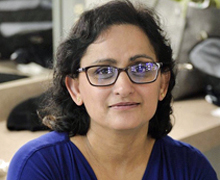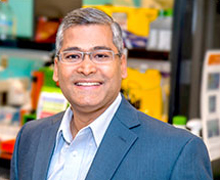Mouse Model for CAR-T Therapy
Studying CAR T cells for solid tumors under conditions that reflect normal human immunity
Technology Overview
 Dr. Vandana Kalia
Dr. Vandana Kalia Dr. Surojit Sarkar
Dr. Surojit Sarkar
Chimeric antigen receptor (CAR) T cell therapy can be effective against several types of blood cancers. However, CAR T cells currently have poor efficacy against solid tumors. Some limitations of CAR T therapy for solid tumors include loss of functional vigor and lack of a persistent population of antitumor memory T cells to prevent relapse.
Studies to improve CAR T therapies often use immunocompromised mouse models with xenografted human tumors. In real-world clinical practice, however, CAR T cells operate within a patient’s complex immune system. Therefore, studies using mice that lack a functional immune system have limited translational impact. For example, toxicities that involve immune system signalling, such as brain swelling after adoptive cell transfer with CAR T cells, are not detected by assays that use immunodeficient mice.
Drs. Surojit Sarkar, Vandana Kalia and Michael Jensen developed a novel platform for studying CAR T cell therapy under conditions that are more physiologically relevant than immunodeficient mouse models. This team is using the platform to improve the relevance of preclinical studies of CAR T cell therapy and to understand the mechanisms underlying its current limitations.
The platform is based on an immunocompetent mouse model and a library of mouse tumor lines that are known to mimic specific types of human cancers. Proof-of-principle studies show that adoptive transfer of mouse CAR T cells into the immunocompetent mouse model results in appropriate targeted responses against tumor cells.
Drs. Kalia and Sarkar are interested in creating research partnerships that use these tools to study the in vivo biology of CAR T cells. Areas of interest include how interactions with the immune system of an adoptive cell transfer recipient affect CAR T cell localization, exhaustion and functional reinvigoration, preclinical efficacy, potential toxicities, and development of memory cells. They are particularly interested in studies to develop CAR T approaches to treating solid tumors.
Stage of Development
-
Preclinical in vivo
Partnering Opportunities
- Collaborative research opportunity
- Sponsored research agreement
Learn More
To learn more about partnering with Seattle Children’s Research Institute on this or other projects, email the Office of Science-Industry Partnerships.